- Home
- Dana Cameron
Past Malice Page 5
Past Malice Read online
Page 5
I pulled onto the main street by the common and made the last turn onto the road for the site. I noticed that most of the houses were typical New England colors: gray, white, and yellow clapboards, with the occasional brick house thrown in for good measure. There was one, however, on the far side of the common, that always caught my attention. That was because it was striped with every color you could see on the other houses, and then some. I shook my head and resumed my lecture.
“But we don’t know much about his wife, Margaret. She had, like, nearly a dozen kids who survived. Think about that, in a time when the leading cause of death for women was childbirth. We know she died when she was eighty-six, a tremendous age for anyone at the time. There’s a chance she was literate: The town library has a book with her name in it. But what else? Was she a decent person? How did she use her position in town? Was she a hostess of renown or a shoddy housekeeper? Was she religious, how did she treat her servants, did she like living in Stone Harbor or did she wish she was back in England every day of her life? There are so many questions I could ask, and yes, it is important to know these things.”
We made it down the long, tree-lined avenue, heading for the large colonial house at the end of the road, and I turned into the parking lot off at one side in the front and killed the engine. If I’d rolled down the window and listened carefully, I could have heard the waves crashing on the other side of the property.
“The best reason I can give you, Bucky, is that when you are studying anything, I don’t care if it is history or archaeology or chemistry or whatever, you don’t ignore more than half the population. You can’t only look in the light for your lost keys, you have to forage a little further afield than that. What you don’t know is going to shape what you do know. You see what I mean?”
She didn’t. Bucky was fast asleep, her head against the passenger side window.
I thought about waking her, even thought about whispering “Ma’s here” in her ear—that was always good for a reaction—but decided to let her sleep. I got out, got my stuff, and, after a moment’s hesitation, shut the door quietly behind me.
I crunched down the gravel of the parking lot toward the house, waving to Fee as I walked by the window to her office. She didn’t notice me at first, and I saw that she was talking on the phone; she looked distinctly worried. I paused, wondering whether anything was wrong, and then she saw me and a huge, false smile split her face. It was like watching a curtain rapidly descend as another set magically transformed the stage. I waved again and walked around the right side of the house, unlatching the gate and letting myself in.
This was one of the perks of the ungodly early hours that archaeology demands: seeing the site before everyone else arrived, being on the property when it was still quiet and largely deserted. I took a sip out of my travel mug and took it all in: the back of the house, with its small ornamental garden directly outside it, a slight drop-off, following the natural slope of the ground, cut by a short, wide staircase that led to the lawn below. The lawn was mown and well-trampled by the visitors who wanted to get the great view of Stone Harbor’s harbor, to my right, and Sheep’s Head Island, a little lump of rock and scrubby bushes, about a half mile from the shore and directly in front of us. I was pleased to see that the Chandler House people had put a sturdy picket fence well in from the bluff’s edge, to keep visitors from straying too close to the edge. To my left, looking northwest up the coast, was a bit of empty wooded coast before you could see the jutting point of Lawton, which was like a splinter stuck between the larger harbors of Stone Harbor and Boxham-by-Sea. It was in this area that the Mather House was located. Now abandoned, it had been built by the Chandlers some time after their house, and it had taken on the name of the owners during the nineteenth century. I was eager to find out who owned it now, as it would be a real opportunity to compare two households from roughly the same period, especially as the first few occupants of the Mather House had been members of the Chandler family too.
To my right, only a meter or two from the side of the house, was the collection of squares and regular rectangles of blue tarps that covered my units, held down by rocks. These were on the right side of the house, and at the edge of the property, demarked on that side by a coated chain link fence. I could just about make out the infernal Bellamy’s house across the street through the trees on our side. Ruin their view, indeed. I could hear the sound of dogs barking.
I took another sip of my coffee, walked back, and began pulling the tarps away to get a look at the units. I had to reach down into a unit and fish out one anchor rock that must have slid in overnight. Meter-square holes in the ground, at most maybe half a meter in depth, the different layers of dirt stacked up, the oldest at the bottom, the newest at the top, looking like an uneven sort of layer cake. Imagine a laundry pile, I always told my freshmen, where the things on the bottom are what got thrown in first, on Monday, and the things on the top were thrown in last. Now in archaeology you might not know how much time has passed between one layer and another, but you can usually assume that the stuff on the bottom is older than the stuff on top, unless there’s been some catastrophic event—like landscaping or an earthquake—that’s moved things out of order. Kind of like me rooting through the laundry on Thursdays to see if I have already worn my favorite shirt. By the way things looked here, based on the artifacts we were finding, we were probably looking at a late-eighteenth-century living surface in this unit, and Meg, as usual, was a bit farther down from that, possibly to the mid-eighteenth century, right above the burn layer that we knew was the result of the fire in the 1730s. We also had a brick feature there that looked suspiciously like a house foundation; perhaps it was the foundation of the wing that had been here once upon a time.
I squatted down to stare at one particularly interesting stratum, a layer of soil that looked like clean sand, and tried to figure out what it could be, when I heard something that I thought at first was a seagull. I then dismissed that notion in favor of a slipping fan belt, but was forced to the realization that it was a woman’s voice. It was directed at me.
“Look, I can see you over there! Don’t you think it’s a little childish to be avoiding me like this? I really think we need to talk about this situation.”
Situation? I looked around to see whether she wasn’t actually speaking to someone else.
“Yes, you. Come on over, I’m not going to bite.”
Maybe not, lady, I thought, but I might. I couldn’t help myself; I didn’t have any idea of what the problem was and I was already predisposed against her. I hadn’t gotten a good look at her before now, but that didn’t help either. Her demeanor was one of aggression uncomfortably married to cuteness. Her hair was a frizzy, nondescript brown, cut short in a way that did nothing for her round face; some of it was caught up in a pink scrunchy on top of her head. Her stocky posture was like that of a bulldog, her jejune bangs and topknot reminded me of a Shih Tzu, and the way she couldn’t quite keep her mouth closed, showing her pointy little teeth, was distinctly puglike.
I got up and dusted myself off automatically even though it was still too early for me to have gotten dirty. “How can I help you?”
“Claire Bellamy.” She didn’t offer her hand, but jerked her head back toward the house across the road. The sound of large dogs barking loudly seemed to continue nonstop. “I live across the road there, and your students have been causing a real disturbance.”
“I beg your pardon?”
“You’re the archaeologist, right?”
“Yes, I’m Emma—”
“The way your students were carrying on out here this morning really is unacceptable. It’s starting to affect my quality of life, more than that, it’s beginning to take a toll on my children.”
“I beg your pardon? My students? My students haven’t even arrived yet, they were still at home when I left, maybe twenty minutes ago.”
“Well, I don’t know who else you think it could possibly have been. All I know wa
s that there was all sorts of racket out here about five-thirty, by this side of the house. Where you’ve been working. Then there was all this noise, tires squealing, and by the time I made it to the window, I saw a dark car taking off down the road. If it wasn’t your students, who else could it have been?”
She was nuts. “Mrs. Bellamy, it could have been anyone.” I recalled that Perry had been hit by a dark-colored vehicle. “This is a public road—”
“And I still don’t understand that, if ours is the only house on it—”
And yet you’d probably complain if it wasn’t plowed first thing in the morning during the winter, I thought. “The Chandler House is on it too. Maybe someone got lost and was trying to turn around; it could have been kids fooling around, it could have been a lot of things, but I know for a fact it wasn’t my students. None of them has a dark car, none of them is even here yet.” And fully one-fifth of my crew was stark naked at that hour, so I know she didn’t even have her car keys on her, I concluded to myself.
Her eyes welled with tears, reminding me of those pictures of sad clowns. “You don’t understand, this is just not acceptable. We moved here for the quiet and all we get is noise and trouble. It’s not fair. If I’m not even allowed to sleep in my own house—”
I watched her chin quiver and I bit my tongue, trying to keep from saying what was really on my mind, that her dogs barking and her attitude were probably more than half the problem. “I’m sorry you were upset, and I’m sure that it was vexing to be woken up, but I assure you, it was nothing to do with me. Now if you’ll excuse me, I have to get back to work.”
“Wait!” she called after me. “You’ve been told, haven’t you, that you’ll have to get rid of all this mess by next Saturday, right? I can’t have my guests over with this going on over here.”
I recalled the discussion about this topic from last night’s meeting, and decided to pretend I hadn’t heard her. That wasn’t an option, however, as I was rapidly learning what was meant by the expression “shrill as a fishwife.”
She pressed on. “You are going to close up these holes, right?”
“I haven’t been told anything of the sort. As far as I understand the matter, the board is quite pleased to go along with our original agreement, which means that I’ll close up here when I have finished my work, in about two weeks. That’s not a very long time and in any case, you really wouldn’t want to burden yourself worrying about what is going on with someone else’s property. Unless your guests are going to be hanging out in your side yard, next to the trash bins, I doubt they’ll even notice that there are holes in the ground over on this side of the street. And if they did, you could use it as a conversation point. They might find it interesting.”
She put her hands on her hips. “You know this conversation is really pointless—”
Hallelujah. My thoughts exactly.
“—and I’m just going to have to bring it up with your boss.”
She paused and waited to see how I would react and then I realized that she was talking about Aden Fiske and not the dean or someone at Caldwell College, where I teach.
I nodded solemnly. “I think that’s really for the best. I’m sure you and he will work something out. But in the meantime, what are you going to do when the real disturbance starts? What are you going to do when they start construction on the gift shop?”
Mrs. Bellamy looked suspicious, as though her victory had just been snatched away from her. “What do you mean?”
“If you’re upset now, what will happen when a construction crew comes in here and starts putting together a little shed for gifts and restrooms and that sort of thing?”
Her mouth moved for a few seconds before she could make the words come out. “They can’t do that!”
“Why not? They seem to be doing it now; you didn’t get a notice about this from the city, to come to a planning meeting and discuss it?”
“There was something—but no one said that this was going to happen! This is incredible!”
That’s how houses get built, I thought. I shrugged. “I guess you should have spoken up then.”
Trembling anger made Claire Bellamy resemble an irritated Shih Tzu even more, and when I turned away to get back to work, I could feel her eyes boring little holes into my back before she finally huffed and went away. I was just glad that Bucky was in the car asleep, or that wouldn’t have gone as smoothly as it did: Bucky had no sense of tact. Then I was kind of sorry that my sister wasn’t there for the show; I always envied her ability to combine wit with her sharp tongue. It would have been fun to watch, even if it wasn’t good politics, an immature part of myself complained. Nice fireworks before Independence Day.
I squatted back down to look at what Meg was in the process of uncovering, swallowed the last mouthful of my cold coffee, then stood up again with a frown. If there had been someone out here, early in the morning, causing a “racket” as Mrs. Bellamy called it, what were they doing by the side of the house? More than that, had they been doing anything to the site?
I pulled the rest of the tarps back, but nothing appeared to be amiss, apart from the unit where Joe was working. There were two slight concavities in the side of one, near the top, and I realized that Joe had been sitting on the edge of his unit to take notes, compacting the soil underneath him and leaving an impression of his bum. There was no real harm yet, but I’d warn him to sit outside the unit, so the wall wouldn’t collapse as the soil dried out. Nothing wrong here, so I strolled around the side of the house, where there were some trees and bushes planted to conceal the maintenance shed and trash bins. This was where we’d located our spoil heaps, but there was nothing wrong there either, no trash, no beer bottles that might have been flung by teenagers partying down by the water, no sign that the shed had been at all tampered with, which was good, because that’s where we were storing our tools and screens at night. I heard Bucky call my name, her voice coming from in back of me, by the units.
“I’m back here, Buckminster. I’ll be out in a second.” I noticed something by the far edge of the shrubs, almost to the front of the house. It wasn’t anything more than an odd break in the shadows, a little more solid than I expected to see there, but I thought I’d have a look in any case. As I walked past, dozens of little sparrows flew out of the bushes where they’d been hiding, nesting, sleeping, whatever.
“Sorry guys,” I said. “I didn’t mean to get you up at this ungodly hour too. Though technically it’s in your contract to be awake by now.”
The break in the shadows resolved itself into a patch of mottled pale light and utter black, far too definite to be a shadow, the breaks too regular. Then I realized that the mottled white was actually part of someone’s lower leg, the flesh that showed between a dark sock and where the trouser rode up. Even at that point, it took a moment before I really understood what I was looking at: the laced black shoe, the sock, the skin of a man’s calf, the hem of a trouser leg.
“Emma? Where are you?”
—The leg of the man continued and I realized that someone was lying face down, a hand palm up, fingers slightly curled showed now. A sickly sweet smell hit me and then I realized that the sound of buzzing insects was not inside my head—
“Emma? Do you need help with the tools?”
And then I saw the darkened stains in the soil around Justin’s fair hair and was glad that I couldn’t see the rest of his face, concealed in the underbrush. I stepped back, swallowed, swallowed again, and thought about being sick—What should I do?
“Emma, cut the crap, where—?”
That woke me up when nothing else might have. “Bucky! Don’t come back here!”
“What?” I could tell that she’d stopped; it must have been something in my voice.
“I mean it! Don’t come back here!” I turned and stumbled back past the bushes, startling another flight of sparrows from their roosts with a rustling and low whistling. My legs felt rubbery, as if they hadn’t gotten the message that I wan
ted to be out of there and wanted above all else to keep my sister from seeing what was back there. A breeze picked up and I shivered, all of a sudden realizing that I’d broken into a sweat. I couldn’t feel my hands and my mouth felt as though it was stuffed with cotton. I swallowed again and picked my way across the spoils heap, catching my foot on a large cobble and almost tripping into Bucky. I saw my sister’s eyes go wide and wondered what I looked like.
It took me a moment to articulate anything of the horror I’d just seen. “Bucky, you…don’t go back there.”
“Emma, tell me what’s wrong!”
“There’s a body…a security guard…Justin. He’s back there.”
I couldn’t actually say the words out loud. Bucky looked at me, forehead wrinkled with concern, chin pulled back with reluctant realization, eyebrows arched, asking the question.
I nodded. “We have to call the cops. Right now. He’s been killed.”
Chapter 4
I’D SAID THAT I THOUGHT JUSTIN HAD BEEN KILLED before I could figure out just how I might know that he wasn’t simply dead. I didn’t have time to go back over what it was that I’d seen that made me choose that word rather than another, because it was exactly at that moment that the graduate students arrived; I could hear them chattering and the sound of car doors slamming. Gathering myself, trying to keep a bad situation from getting worse, I turned to Bucky and held her by the shoulders.
“Stay here. Don’t let anyone else through, and for God’s sake, don’t go back there yourself. I’m going in the house to find a phone.”
Bucky was ashen. “Okay.”
I hustled around to the other side of the house, thinking how I hated seeing my sister look like she did, and almost ran into the four members of my crew. “Hey, Meg, you guys. Do me a favor. Could you wait out by the cars for a minute? There’s…there’s been an accident.” Even as I said the word, I knew it was an easy mistruth. “I think it would be a good idea if we didn’t start right in to work. It might be a lab day, today.”

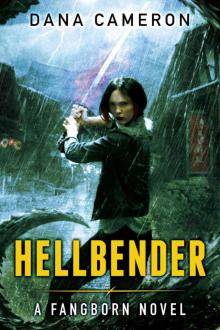 Hellbender (Fangborn Book 3)
Hellbender (Fangborn Book 3)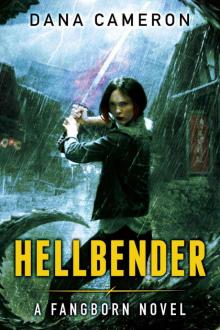 Hellbender (The Fangborn Series Book 3)
Hellbender (The Fangborn Series Book 3) Hellbender
Hellbender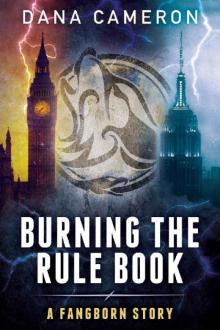 Burning the Rule Book
Burning the Rule Book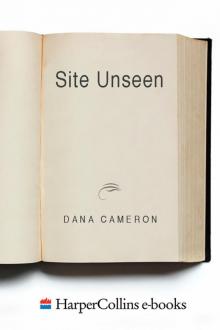 Site Unseen
Site Unseen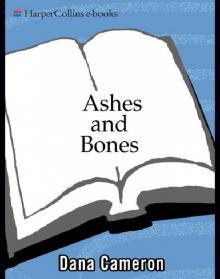 Ashes and Bones
Ashes and Bones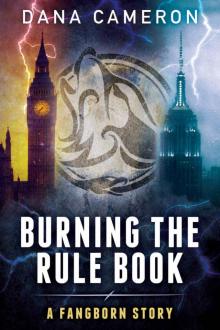 Burning the Rule Book (A Fangborn Story 3)
Burning the Rule Book (A Fangborn Story 3)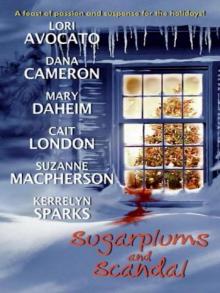 Sugarplums and Scandal
Sugarplums and Scandal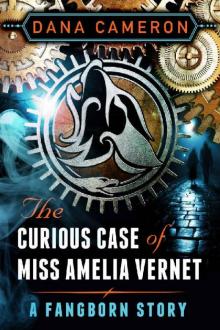 The Curious Case of Miss Amelia Vernet
The Curious Case of Miss Amelia Vernet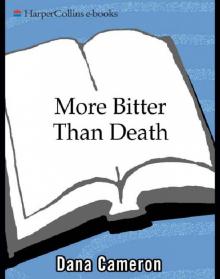 More Bitter Than Death
More Bitter Than Death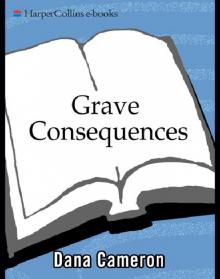 Grave Consequences
Grave Consequences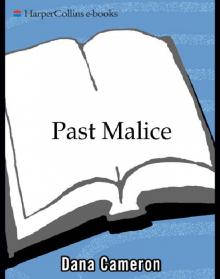 Past Malice
Past Malice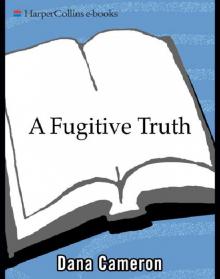 A Fugitive Truth
A Fugitive Truth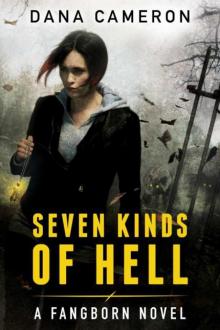 Seven Kinds of Hell
Seven Kinds of Hell